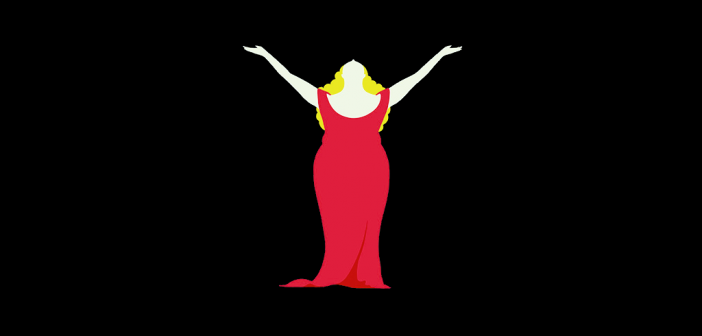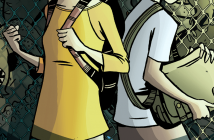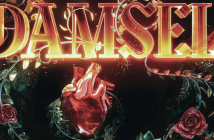I’ve thought and written and talked a lot about the representation of fat characters in YA. So when Nicole approached Sarah Hollowell and me about moderating a round table, I was all in. Sarah and I were thrilled to host Becky Albertalli, Julie Murphy, Elle McKinney, Angel Cruz, Amy Spalding, and Sandhya Menon and talk with them about fatness, how we see ourselves, and how we can do better in the future.
Let’s talk about the words for fat—or, rather, the words that aren’t “fat.”
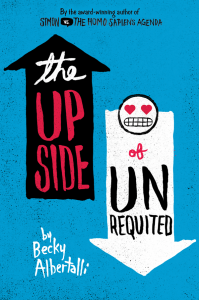 AMY SPALDING: Once I embraced “fat”, I myself have mostly done away with the other euphemisms. I use plus-size sometimes when I’m talking specifically about clothing/stores, but I like that fat is very matter-of-fact. It also, I think, often challenges people to think about fat people in a different way. I’ll have people say, “Oh, you aren’t fat!” and I have come to enjoy helping them unpack what they mean. Because, like, I am fat. But I’m certainly not a negative fat stereotype, and the more I can help non-fat people see that it’s a neutral descriptor, the better off we’ll all be.
AMY SPALDING: Once I embraced “fat”, I myself have mostly done away with the other euphemisms. I use plus-size sometimes when I’m talking specifically about clothing/stores, but I like that fat is very matter-of-fact. It also, I think, often challenges people to think about fat people in a different way. I’ll have people say, “Oh, you aren’t fat!” and I have come to enjoy helping them unpack what they mean. Because, like, I am fat. But I’m certainly not a negative fat stereotype, and the more I can help non-fat people see that it’s a neutral descriptor, the better off we’ll all be.
JULIE DALY: I do the same. I only use plus-sized when referring to shopping, but otherwise use fat? So the fact that I just saw someone use, “plump, but not unpleasantly so” to describe a person has me feeling…SOME THINGS.
BECKY ALBERTALLI: I like fat the best. I’m actually kind of surprised I’ve come around to that, because the word definitely had negative connotations for me growing up. I’ll say chubby sometimes, and plus-size in reference to clothing or people who prefer to ID that way (I mean, I’ll just call people whatever they want to be called, when it comes to fatness or anything). I get a bit of pushback sometimes on “fat.” Literally every single time I’ve ever publicly referred to myself or my characters as fat, my mentions turn into a mess of people objecting to the word or telling me I’m not fat, I’m beautiful, etc. IT’S EXHAUSTING. I mean, I get it – again, I also had those negative connotations about “fat” for a very long time. But I’ll never understand the impulse to repeatedly correct someone who presents this as a neutral label.
JULIE MURPHY: I feel very strongly about the word fat. I think because I was always the funny fat girl growing up, I had picked up on the trick of making fun of myself really early on, and that meant embracing the parts of me I was made fun of for. So maybe it wasn’t the healthiest way to embrace the word fat, but I using the word fat long before I knew it could be empowering. Once I figured that out, using any other word felt foreign and powerless. Not to say that other words are powerless. Descriptors are personal. But I always like the way “fat” made people pay attention. Whether they were shocked, disgusted, or intrigued–they were listening. To second what Becky said, nothing is more exhausting as the fat=/=beautiful bullshit.
JULIE DALY: I have SO MANY thoughts on the funny fat girl thing because it was such a part of who I was for so long? And in a way, it still is. Once you’ve learned to be funny, it doesn’t really stop.
AMY SPALDING: I am often the funny fat girl, which I never mind except when it’s like that’s all I’m allowed to be. And it’s kind of amazing just how often people will assume that’s all there is to me.
ANGEL CRUZ: Is it weird if I say I haven’t really thought about the word “fat” until the last few years? Part of it is the word I associate most with my looks is the Tagalog “mataba,” which carries its own layers of complex feelings. The people that have commented on my appearance most tend to use that word, and so I don’t think I’ll ever be in a place where it will feel comfortable to reclaim that word. It feels easier to say fat, more true and more objective, if that makes sense.
ELLE MCKINNEY: I use fat. I didn’t use to, like when I was a teen or early college. Not because I didn’t think I was fat, or because I thought anything was necessarily wrong with the word fat, but other other words were used. My family is full of large women. Tall, fat, lots of different body types. When we made fun of or teased each other, as kids do, fat wasn’t used like that, and if anyone tried there was an auntie waiting in the wings to set them straight. I also use curvy, full figured, or large lady for myself, and I tend to lean towards using whatever someone else prefers in reference to them.
How is fat representation right now in terms of intersectionality?
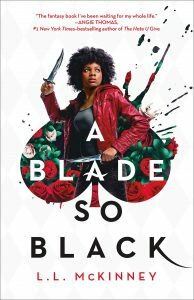 BECKY ALBERTALLI: This is a space where I’m going to shut up and listen.
BECKY ALBERTALLI: This is a space where I’m going to shut up and listen.
SANDHYA MENON: I don’t think I’ve seen a fat South Asian main character represented positively in any YA book (or adult book, for that matter). This really bothers me because I think South Asians in general–and certainly Indians–have a very complicated relationship with fatness. Fat Indians or Indian Americans are not rare, and still, it’s very acceptable for parents tell their kids things like, “Go run around the backyard until dinner time–you’re getting fat.” I cannot remember a single positive comment about their own body from any adult female member of my family (because they were fat), but I can remember dozens of comments along the lines of, “I’m so disgusted with myself/I’m so ugly/she’ll never get married because she’s fat.” As a kid, this definitely equated to me thinking, “Wow, being fat is one of the worst things I could do.” And so, as an adult, when I did become fat, there was this whole fog of complicated feelings around it–for me and for those who’d known me when I was thin.
AMY SPALDING: In general, I think my big issue here is that so often, fat didn’t get to be intersectional, because if a character was fat, that was their story. The story is often about fatness, even if a character is going through other things. My latest book is about a queer fat girl, because I felt like it was time for me to write a fat character, but, to be honest, I didn’t make that decision because I felt like queer fat rep was lacking (though it was). It’s more that all fat rep seemed to be lacking!
JULIE MURPHY: My first memory of a fat queer story was She’s Come Undone and it has been so damn long since I read that book that I don’t think I could say anything about it except that I remember it making me sad but also seen? But anyway, like Amy and Sandhya have already said, there have been so few intersections, because the few stories we do get are always about fatness. That said, (and if I say something offensive, please call me the fuck out), maybe it’s a geographical thing, but I have often found myself to be the one white person in the room. I went to a primarily Mexican elementary school and an entirely black church through high school.
JULIE MURPHY: To speak to what Sandhya said about parents, there was always something that unnerved me about the way nonwhite people talked about fatness. Not that they were more rude than white people, because white people are assholes, but they were more frank? If that makes sense? (Again, please call me out if I’m crossing any lines here.) And at the time that frankness terrified me, but it also helped me become more self aware and less delusional about my body. Like, I think every fat person goes through that feeling of “if I just don’t move or breathe or whatever, no one will notice that I’m fat.” But I seemed to get over that really quickly and I can’t help but wonder if it’s because of how non-white people talked about fatness around me. (I’m still sitting here wondering if there’s a way to talk about this that isn’t like, “Look at all the lessons I learned from POC!”)
JULIE MURPHY: I’ve just typed the longest response, but I also have things to say about queer fatness and how so much of the queer community treats us like fucking allies instead of actual queer people with sexual identities. That said, I think femme ID’ing queers have it way easier than masculine ID’ing queers. It feels like in the queer community vs the straight world, that’s sort of a paradigm shift. Okay, sorry. I have a lot of feelings about this if you can’t tell.
AMY SPALDING: I had a revelation recently that so many people treat me like I either have no sexuality or it must be set to “default” (i.e. straight), and even in queer-centered spaces, like Julie says above, I’ve often had people refer to me as an ally or straight. I’ve had friends say “oh, you’re just someone who doesn’t date and isn’t interested in people” to my face in this dismissive manner. Which would be fine and supportive if that were the case, but instead it’s this idea that fat people by nature aren’t sexual beings.
ANGEL CRUZ: I have yet to see good Filipinx fat rep in media, though I have seen fat rep in some Korean and Japanese dramas that try really hard, even if the end result still leaves a lot to be desired.
JULIE DALY: We’re definitely lacking in queer fat rep and fat rep for PoC. I also think we’re lacking rep for poor people. In general, YA doesn’t have much representation for people who aren’t upper/middle class, but especially poor fat main characters. I think a lot about how expensive it is to dress a fat body and having to buy seat belt extenders or extra seats on planes and I want to see a book that looks at those intersections.
ELLE MCKINNEY: There’s….a lot in regards to fatness and blackness and how the two intersect. In movies or books, fat Black girls and women often intersect with food. There’s a meme that pops up around Thanksgiving and throughout the year. “If your arms don’t look like this (usually fat) you can’t make the INSERT DISH.” It’s a thing. Then you have grandmas and aunties making the big family dinner, or you see them usually with something to eat or drink in their hand. We’re also usually the help, the cleaning lady, the nanny, etc. There’s a whole characterization based on Black fat women. Google Mammy or Mammy archetype. And I haven’t even gotten started with how we’re seen as less, deserving of less. You’ve seen the business with Mo’Nique, right? Let me not.
What are some inaccurate representations of fatness you’ve seen?
 AMY SPALDING: I remember growing up and reading books about fat kids, and their happy endings were always that they lost weight. I never read a book where at the end the girl was still fat but happy about it. I was thin back then, and I’m sure that’s why when I did become fat, I had a hard time being happy with myself, and dealing with a lot of self-hatred for so long.
AMY SPALDING: I remember growing up and reading books about fat kids, and their happy endings were always that they lost weight. I never read a book where at the end the girl was still fat but happy about it. I was thin back then, and I’m sure that’s why when I did become fat, I had a hard time being happy with myself, and dealing with a lot of self-hatred for so long.
BECKY ALBERTALLI: SAME. There just wasn’t anything good for fat rep on my bookshelf (and it seemed like there was barely anything out there in general). I remember reading a handful of children’s books in the vein of what Amy mentioned – kids who lost weight for their happy endings. I also vividly remember how it felt to read books like Bridget Jones’ Diary (which I loved!), where a character was picked on for being fat and/or considered themselves fat, but they were very clearly and specifically portrayed as not fat (Bridget flat out gave us her weight stats basically every time she breathed). I didn’t have the ability to unpack my feelings at the time, and it didn’t even occur to me to critique the book. I just felt secretly bad. I still get that feeling sometimes when I see little comments in books (almost every book, honestly) that equate fatness with badness, or take for granted that fat is a thing that a character wouldn’t want to be.
JULIE DALY: I’ve definitely had to put down books because they had those little comments about why a character could eat all kinds of junk food because they had a fast metabolism and worked out four days a week. Why not eat junk food just because it’s good? (Have we found a better term than “junk food” to summarize that general type of food?) And other little things that people who aren’t fat don’t notice, but I don’t even notice some of it either. Sometimes it just glazes over because I’m so used to it. It’s always hard to realize that.
SARAH HOLLOWELL: Becky, your comments on Bridget Jones reminds me. When I was in high school, a friend gave me She’s Come Undone by Wally Lamb. If you haven’t read it, DON’T. It gave me the most massive panic attacks and I couldn’t understand why until much later. The fat representation in it is really horrific. I think I said I liked it because I thought if it gave me intense feelings, it must be good. I didn’t understand at all what was happening, and of course there wasn’t really any good fat rep in my life to compare it to.
SANDHYA MENON: Becky’s comment rings so true I want to weep. It’s so dispiriting to see heroines portrayed as “fat” only to find out they’re very not-fat, and the whole reason you should be rooting for them is because they’re not really fat, but just misunderstood. This trope needs to die in a fiery fire, I hate it so much. I also grew up watching a lot of Indian TV (Bollywood movies, Indian TV shows, etc.) and the trope there was ALWAYS the fat woman who’s only there for comedic relief, and her only ARC is to fall on her butt while eating something so the heroine can look even more slender/pretty/graceful/whatever.
JULIE MURPHY: I think the book that broke me was Jemima J by Jane Green. (Spoilers ahead.) It was about a British woman who fell in love with a fitness instructor in LA online, so she loses all this weight to go and meet him. They fall in love and start this life together and then she finds out he’s cheating on her with his fat mousy assistant because in reality, he has a fat girl fetish. (I actually think fat fetish and fetish in general gets a bad rep, but that’s another discussion for another day.) But based on jacket copy, I knew she would lose weight and I still held out some kind of senseless hope, because THERE WERE NO FAT GIRLS EVER ANYWHERE. I’ve refused to watch or read Bridget Jones for the exact reason Becky mentioned. Then of course the weight loss trope like Becky mentioned and the funny fat best friend like Sandhya said. Something that really kills me is the Dursleys in Harry Potter. And it’s hard, because the trope of fat = evil gave us Ursula, but she was also sexy and powerful.
ELLE MCKINNEY: I honestly don’t have anything to add. I didn’t see fat girls in the books I read—primarily science fiction and fantasy—but I didn’t see Black girls at all either, so I wasn’t looking for anything remotely intersectional. I didn’t see any part of myself anywhere, so it never occurred to me to even look for books with fat girls. I mean, to be honest, it would’ve been just another white girl. Her being fat wouldn’t have been any better. I was invisible, and in part had accepted it.
ANGEL CRUZ: It’s not necessarily the worst thing I’ve heard over the years, but it is the thing that’s been repeated most in my experience: that being fat means you have no chance at finding love, because who would ever love a fat girl? Objectively, this makes no sense—if someone loves you, they love you for exactly the person you are. Subjectively, emotionally, hearing this can be traumatizing. It’s the kind of rhetoric that puts the onus on fat girls to be something other than what they are to be loved, and if love is conditional like that, how can any of us really trust it to be true? Speaking specifically about Filipino culture, food and the act of feeding and sharing food with other is an act of love—a lot of us grow up being given food by our families and friends, food made out of the kindness of one’s heart. To hear a few minutes later that you’re getting too fat on this same food to be worthy of love? It’s confusing, and painful, and colours the way you see not just that food, but the people who share it with you.
What didn’t you see in fat representation before you wrote your own book?
BECKY ALBERTALLI: Fat girls getting lovingly bullied by their Jewish grandmothers. Lots of complicated feelings about that one.
SANDHYA MENON: This one is close to Becky’s in some ways: Fat Indian-American teen girls and how their parents, especially their mothers, relate to them. So much to unpack because there’s a lot of bullying, but as Becky said, it’s supposed to be loving or motivational or something and…yeah. Very complicated. I also wanted to portray a fat athlete because (A) Fat athletes are so uncommon in YA but are definitely a thing in the real world and (B) Indian-Americans are commonly portrayed as nerds/socially awkward, but hardly ever as athletes, and I wanted to tackle this head on as well. I think an Indian-American fat athlete might be a bit of a unicorn in YA, and we need more unicorns in YA to break that glass ceiling.
AMY SPALDING: I really wanted to write about a fat girl who loved clothing, style, fashion, etc. I am such a clothes addict; I spend too much of my income at Modcloth and participate in Instagram style challenges, etc. But I feel like fat girls in fiction get to be stylish or pretty – it’s only about their size.
JULIE MURPHY: Really just a fat girl feeling desirable. And complex mother/daughter relationships and how our mothers set the bar for how we will process our own bodies.
BECKY ALBERTALLI: Dear god, I’m so grateful for all of you and your books.
ELLE MCKINNEY: I haven’t. I’ve just gotten to where I was able to put a black girl on the cover, which is only after finally being able to see myself as the hero of any story that wasn’t about slavery or the struggle. My first books were about white boys. That’s who was featured in all the stories and movies and shows I loved, that’s who I thought I had to write about to get anywhere. Alice is my first time breaking away from that.
What are some of your favorite examples of fat representation? Is there a topic you think can only be handled by a fat person, or with a very deft skinny hand?
 AMY SPALDING: When I read Dumplin’ by Julie Murphy, I had to keep putting the book down and taking moments to myself because I’d never read a book where a fat character was so, so much like me. I’d never seen fat discussed this way, never seen so many nuanced (and often contradictory) thoughts, because I’d never seen a fat character get the chance to be her own story where fat is a descriptor and not the story’s villain. I was fortunate to be an early reader of the companion book, Puddin’, and I found myself getting choked up during a scene where two fat girls talked to each other. It was so real and yet I’d never, ever read something like this before. It was something so small and ordinary, yet ground-breaking.
AMY SPALDING: When I read Dumplin’ by Julie Murphy, I had to keep putting the book down and taking moments to myself because I’d never read a book where a fat character was so, so much like me. I’d never seen fat discussed this way, never seen so many nuanced (and often contradictory) thoughts, because I’d never seen a fat character get the chance to be her own story where fat is a descriptor and not the story’s villain. I was fortunate to be an early reader of the companion book, Puddin’, and I found myself getting choked up during a scene where two fat girls talked to each other. It was so real and yet I’d never, ever read something like this before. It was something so small and ordinary, yet ground-breaking.
BECKY ALBERTALLI: CO-SIGNING THIS. OMG. I know the scene in Puddin’, and I’m tearing up just thinking about it. I think for me, I’d be nervous about a fat character who hates their body (and/or loses weight) written by a skinny author. If a fat reader I trusted vouched for it, though, maybe? But it’s very hard for me to imagine being into a weight loss narrative written by a thin person.
JULIE DALY: Dumplin’ was probably the first time I read a fat character who wasn’t trying to lose weight and that, in itself, was sort of life changing. The Upside of Unrequited was probably the first time it really felt like me. Molly being anxious and being fat and worrying how that plays into her love life was…a lot of my teen years.
JULIE DALY: I was also thinking a little bit today about the representation of fat characters when I was younger, before I could find books with fat characters that weren’t like the Dursleys. I tried coming up with examples and I came up with Hairspray and Sophie from Anastasia (thanks to Sarah for reminding me of her). Every other fat person I remember seeing was either evil or just an example of what not to be.
AMY SPALDING: Oh, god, Hairspray! I saw it on Broadway right after it won the Tony for best musical, and I was unprepared for how it would make me feel to see a fat girl get the cute boy and also fight for justice.
JULIE DALY: I always forget how much Hairspray means to me until I watch it again. I don’t love the original movie, but the musical? Watching Nikki Blonsky get Zac Efron? Means SO MUCH, especially since I grew up watching High School Musical and Zac was kind of everything.
JULIE MURPHY: Y’all, thanks for the Dumplin’ love. Seriously. Hairspray was HUGE for me. I went on a school trip to NYC in high school and it was the first Broadway show were seeing (and definitely the first I’d ever seen). I remember barely fitting in the goddamn tiny ass theater seats, but I was just OBSESSED. Harvey Fierstein was in the show that night and I waited at the stage door to meet him and as soon as he came out and saw me at the front of the crowd, he said something like “Hey, big girl!” And I was immediately mortified, BUT over time it became the first time someone acknowledged my body in a neutral way, and it was Harvey Fucking Fierstein, so yes, I will always love every iteration of Hairspray forever.
JULIE MURPHY: Another that I know is problematic in some ways, especially for Asian readers, is Eleanor and Park. It wasn’t empowering or anything like that, but Eleanor was visible and Park wasn’t attracted to her in spite of her weight. He was attracted to all of her, and reading that was a milestone moment for me. Another life changing piece of media for me is My Mad Fat Diary. That first season remains one of the most satisfying fat story arcs I have ever seen.
JULIE MURPHY: Ursula is also very important to me. Becky’s Upside meant so much to me. As did Amy’s Jordi—queer fat rep! Hello! And without it being painful. Gabi is also another one I love. All that said, it is still really hard for me to read or watch weight loss stories even when they are done with nuance and an eye toward societal critique. And OMG I can’t believe I forgot, but Dietland by Sarai Walker—incredible! I love Roxane Gay, but still have a hard time reading her sometimes and it’s not because of her. It’s me. And I think it’s because she talks so frankly about the sometimes or often real physical challenges of being fat and she makes room for how painful that can be.
ELLE MCKINNEY: I still haven’t see me, in regards to fat rep, and we’re still fighting for decent Black rep, so… yeah. Here’s hoping!
ANGEL CRUZ: I have also not seen myself in books yet. I don’t know what to hope for, really, because I’ve yet to see it done well, in a way I recognize as real, even if it doesn’t exactly reflect my own experiences.
How can you combat fatphobia in your own work?
 AMY SPALDING: Yes, for sure. I honestly have more internalized fatphobia than my characters do. Partially this is because I am old as dust and have carried these things for decades longer, but also because I just don’t want to put that out there on the page. There’s nothing unrealistic about a fat girl who doesn’t hate herself, and it feels really good writing that. Then if societal things come up, it can be about unpacking or dismantling them instead of it coming from within. I know that I have changed some people’s attitudes just by being chill and comfortable publicly about my size or about food, so it makes me hopeful for people to read the positive examples we’re listing here and see that many fat people aren’t constantly thinking about their thighs or their next meal, or that they’re constantly miserable.
AMY SPALDING: Yes, for sure. I honestly have more internalized fatphobia than my characters do. Partially this is because I am old as dust and have carried these things for decades longer, but also because I just don’t want to put that out there on the page. There’s nothing unrealistic about a fat girl who doesn’t hate herself, and it feels really good writing that. Then if societal things come up, it can be about unpacking or dismantling them instead of it coming from within. I know that I have changed some people’s attitudes just by being chill and comfortable publicly about my size or about food, so it makes me hopeful for people to read the positive examples we’re listing here and see that many fat people aren’t constantly thinking about their thighs or their next meal, or that they’re constantly miserable.
SANDHYA MENON: I’m one of those people whose weight fluctuates a lot and very quickly, which means I’ve been fat at some points in my life and thin at others. It’s so eye-opening to see how people treat a fat woman of color as opposed to a thin woman of color. It’s disheartening and awful. It also means that when I’m starting to gain weight, I’m gripped by anxiety because I know what that means for me socially. I have to make a conscious effort to examine all the fatphobia I’ve internalized, all the questions (like “Are you pregnant?”—everyone’s favorite, or the time a doctor assumed I liked to eat “fatty, greasy food because it tastes good” just because of what my weight was) that make me uncomfortable to just go out in public when I look a certain way. Actively seeking education from the fat positive/fat acceptance movement online has immensely helped me deal with this internalized fear of myself as a fat person.
JULIE DALY: I was thirteen the first time someone asked me if I was pregnant and it’s STILL one of the most traumatizing moments of my life. It’s happened twice since and I hate it so much.
BECKY ALBERTALLI: So, I’m very much in the same boat as Amy, where I do everything I can to keep my own internalized fatphobia out of my books (and my parenting, for that matter). I’d almost say I approach it as if I’m writing outside my lane – research, listening to intra-community conversations, etc. I don’t think I was ready to write Upside until I’d spent literally a year reading everything I could find about the fat acceptance movement. It was actually a really lovely and healing experience.
ELLE MCKINNEY: I have yet to write a fat protagonist, but I was still mindful of the language that gets used. Fatphobia can crop up even when a fat person isn’t present. Having dealt with much of what’s been discussed, I’m hoping to take the same care then as I do now. More care even. Always learning and growing, right?
ANGEL CRUZ: I am currently writing a fat protagonist, and while (in this draft) it isn’t a driving force or influence in the story, I have tried to surround this character with people who love and build her up constantly. I think a lot of us have had to learn how to show love to ourselves, the unique things that we respond to and feel in our hearts, and I am trying to give this character some of those things to experience. In my own life, I have tried to be more vocal about fat representation, and I have also tried to keep nuance in mind as I do it–not all of us are going to agree on everything, but it is always possible to have constructive and honest conversations while doing that.
Has your view of your fatness changed because of other fat women?
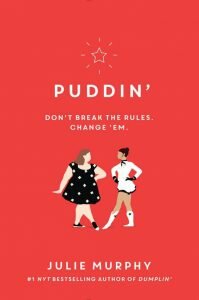 JULIE DALY: I feel like Dumplin’ was really a kickstarter for me in realizing how much YA was lacking in fat rep and helping me think about this kind of stuff and want to talk to other fat women about being fat, to be honest.
JULIE DALY: I feel like Dumplin’ was really a kickstarter for me in realizing how much YA was lacking in fat rep and helping me think about this kind of stuff and want to talk to other fat women about being fat, to be honest.
AMY SPALDING: I must say that having really cute plus-sized clothes become more available probably was the biggest breakthrough for me. Once I got to look how I wanted (versus a compromise because the kinds of clothes I wanted weren’t in my size), my self-image felt more within my control again. To me there’s also something about looking a certain way (I am extremely obsessed with clothes and makeup and my hair) while fat that I think can challenge non-plus-sized individuals’ ideas of what fat even is. It’s not that I’m some “better” version of fat (I’m really, really not) but I certainly challenge some stereotypes.
BECKY ALBERTALLI: Conversations with other fat women—and reading writing by other fat women—has been THE gamechanger for me.
ELLE MCKINNEY: I am forever salty as hell that I have to spend a quap on clothes just to look halfway put together. But yeah, being able to buy clothes myself—no one was spending $50+ dollars on a pair of jeans in my house—made a difference. It still get a little lightheaded when I see the receipt, but feeling the way I feel when I look in the mirror now is worth it.
ANGEL CRUZ: I have to give a shoutout to Sarah Hollowell specifically here. Sarah’s confidence and general attitude towards fashion and beauty have been incredible influences on my own attitude. In the last two years, I have shifted the way I’ve dressed myself, and not let myself be so afraid to try new things. I used to hate wearing dresses, because the dresses I tried never draped well on me. Finding dresses and styles that fit me well really changed the way I started to look at myself.
JULIE MURPHY: Clothing has been hugely political for me. I started working at the Torrid in my town that had just opened when I was 16yo. I remember being so embarrassed for my friends to see me there and for them to realize it was a plus size store, but at the same time feeling so empowered and in my element. Those years working at Torrid are my earliest memories of me truly acknowledging my fatness in a neutral way. Demanding good, fashionable clothing might seem like an inconsequential or even superficial, but it’s all about accessibility in a really basic way.
JULIE DALY: I’m also curious about how y’all feel about the body positivity movement, especially about the idea of loving your body and feeling beautiful as a fat woman vs just not being hateful towards yourself and the weird lines of being happy in your body but still wanting it to change. I know that I love my body and I’m happy with how I look and I want everybody to at least feel comfortable in their skin, but I also wouldn’t mind losing weight so I wouldn’t have to deal with all of the struggles that come with fatness and because I think I’d still look good. I’m curious how y’all feel on that.
BECKY ALBERTALLI: This one’s hard for me, because I had a really tough time with my body growing up, and it’s a daily struggle to push back against the aftermath of that. I know that my size sometimes fluctuates, and I am deeply uncomfortable with receiving positive feedback for weight loss. It makes me feel sick. But I do get wistful sometimes thinking about how much easier certain things were at points in my life when I weighed less (like, shopping for plus size movie premiere clothes? Not easy. Not fun). I think for me, it’s helpful to let myself be frustrated by that, and make room for the negative feelings I sometimes have toward my body. Given the kind of cultural messages we all receive, and given some of my specific experiences, that’s always going to be an issue for me. But when it comes to my work, my public persona, and my parenting (everything I put out into the world), the fat acceptance movement is my touchstone. I can grapple with my own stuff privately, but I will fight tooth and nail against putting more fatphobia out into the world.
ELLE MCKINNEY: I think the body positive movement, co-optive as it is, does shed a more positive light on what it means to love who you are and being okay with who you are. I am just fine in my skin. Would I like to lose weight? I’d be lying if I said no. But it would be a choice I made for me, not because there’s anything wrong with being fat. I think my feelings on this might be less complex because there are lots of things I face as a Black woman that are along this “if you do A, you hate yourself” spectrum. And not just that, you also hate your people and your Blackness as well. Straightened your hair? Hate yourself. Wear weave/wigs? Hate yourself. It even extends to personal preferences. Don’t like rap music? Hate yourself. I mean, I do like rap music, but I prefer rock, punk, classical, J-rock, lots of stuff over it. Pretty much anything I want to “change” about myself or go against stereotypes means I hate myself. Then you tie in “feminism.” Like makeup? Not a feminist. Like heels and pink? Not feminist. Want to be a homemaker? Not feminist. So I’m gonna do what I wanna do because I wanna do it. It has nothing to do with the rest of the world, so the rest of the world can suck it? I know I’m not ending on much of a high not, so to make up for that WAKANDA FOREVER!
ANGEL CRUZ: I used to feel like I had to match up to a certain attitude towards body positivity for my voice to matter. But trying to do that was exhausting and discouraging in a lot of ways, so I just stopped, and I decided to work through my thoughts and feelings around body positivity in my own way. I think realizing that I was allowed to feel a certain way now, and that that feeling might not last and might change, was really freeing. I try not to lose myself in thinking about being fat or body positivity, cause what’s the point if I’ve lost the person I am anyway? I’m Filipina, and I’m Catholic, and I have never seen myself leading a charge in media, but I’m still here. I can only be me, and I can only do what I can do, and if someone finds that to be positive fat representation, great.
JULIE MURPHY: I love my body, but like everyone else in existence, I’m constantly at war with it. I think the only way I can come to terms with loving my body and wanting it to be different (thinner, healthier hair, better skin—I could go on forever!) is that the best thing I can do for me is to take care of my body because I love it and not because I hate it. So for me that means things like taking vitamins, doing yoga, intuitive eating, and a few other habits I’ve tried to develop. In order to live with myself, I have to be okay if I lose weight and I have to be okay if I don’t. Regardless of what happens to my body, I still have to live with who I am. I can’t control what my body does, but I can do the emotional labor of attempting to love myself regardless. I think the important thing is that if you are hoping to lose weight in some way, don’t buy into diet culture. Don’t feed money into companies who profit off of our own ingrained self-loathing. And look critically at companies who have co-opted body positivity for their own financial gain. Ultimately body positivity was created to demand actual physical accommodations and combat discrimination for fat people. It wasn’t created to make already conventionally attractive people feel better about themselves. If that’s a byproduct of body positivity, then great. I think I got off track here. Anyway, I want everyone to love themselves, but I will fight until the day I die for fat people to see their value and the best way I know how to do that is by tearing down diet culture and that starts with the corporations who profit off of bullshit beauty standards.

